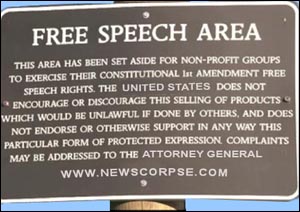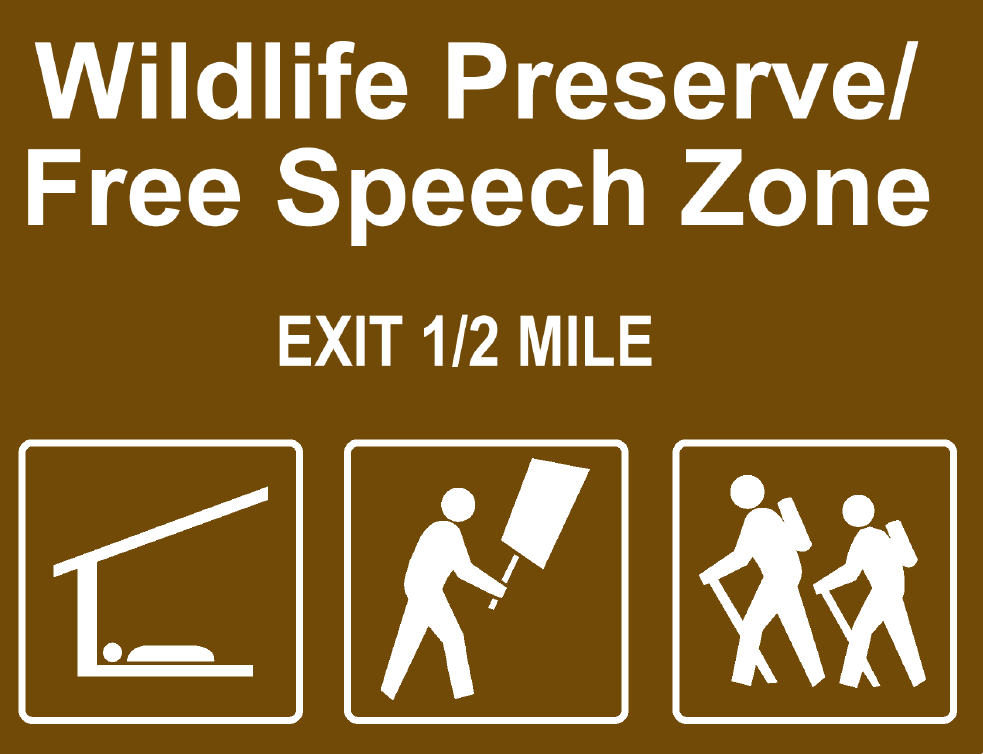Citaat:
Oorspronkelijk geplaatst door Supe®Staaf

Ken je speaker's corner?
Zo een ruimte kan overal zijn.
Een afgebakend deel van de publiekelijk toegankelijke ruimte.
|
Op zich een prima idee hoor @Supe®Staaf, maar ook daar kan misbruik van gemaakt worden...
In het 'land of the free' hebben ze zulke zones, zogenaamde 'free speech zones/areas'.
Free speech zone
Het afbakenen van zones waar men het eerste amandement in de praktijk kan omzetten. In feite zou het volledige Amerikaanse grondgebied een free speech zone moeten zijn, maar in de praktijk wordt dit beperkt tot deze daartoe bestemde locaties.
Free speech zones (also known as First Amendment Zones, Free speech cages, and Protest zones) are areas set aside in public places for political activists to exercise their right of free speech in the United States. The First Amendment to the United States Constitution states that "Congress shall make no law... abridging... the right of the people peaceably to assemble, and to petition the Government for a redress of grievances." The existence of free speech zones is based on U.S. court decisions stipulating that the government may regulate the time, place, and manner—but not content—of expression. A free speech zone is more restrictive than an exclusion zone[citation needed].
The Supreme Court has developed a four-part analysis to evaluate the constitutionality of time, place and manner (TPM) restrictions. To pass muster under the First Amendment, TPM restrictions must be neutral with respect to content, narrowly drawn, serve a significant government interest, and leave open alternative channels of communication. Application of this four-part analysis varies with the circumstances of each case, and typically requires lower standards for the restriction of obscenity and fighting words.
Free speech zones have been used at a variety of political gatherings. The stated purpose of free speech zones is to protect the safety of those attending the political gathering, or for the safety of the protesters themselves. Critics, however, suggest that such zones are "Orwellian",[1][2] and that authorities use them in a heavy-handed manner to censor protesters by putting them literally out of sight of the mass media, hence the public, as well as visiting dignitaries. Though authorities generally deny specifically targeting protesters, on a number of occasions, these denials have been contradicted by subsequent court testimony. The American Civil Liberties Union (ACLU) has filed, with various degrees of success and failure, a number of lawsuits on the issue.
...
Free speech zones were also used in New York City at the 2004 Republican National Convention. According to Mike McGuire, a columnist for the online anti-war magazine Nonviolent Activist, "The policing of the protests during the 2004 Republican National Convention represent[ed] another interesting model of repression. The NYPD tracked every planned action and set up traps. As marches began, police would emerge from their hiding places — building vestibules, parking garages, or vans — and corral the dissenters with orange netting that read 'POLICE LINE – DO not CROSS,' establishing areas they ironically called 'ad-hoc free speech zones.' One by one, protesters were arrested and detained—some for nearly two days."[15] Both the Democratic and Republican National parties were jointly awarded a 2005 Jefferson Muzzle from the Thomas Jefferson Center for the Protection of Free Expression, "For their mutual failure to make the preservation of First Amendment freedoms a priority during the last Presidential election".[13]
Falun Gong protesters inside a fenced-off free speech zone at the 2000 Presidential Debate at Washington University
Free speech zones were commonly used by President George W. Bush after the September 11 attacks and through the 2004 election. Free speech zones were set up by the Secret Service, who scouted locations where the U.S. president was scheduled to speak, or pass through. Officials targeted those who carried anti-Bush signs and escorted them to the free speech zones prior to and during the event. Reporters were often barred by local officials from displaying these protesters on camera or speaking to them within the zone.[3][4] Protesters who refused to go to the free speech zone were often arrested and charged with trespassing, disorderly conduct and/or resisting arrest.[16][17] A seldom-used federal law making it unlawful to "willfully and knowingly to enter or remain in ... any posted, cordoned off, or otherwise restricted area of a building or grounds where the President or other person protected by the Secret Service is or will be temporarily visiting" has also been invoked.[18][19]
Criticisms
A "First Amendment Area" at the Muir Woods National Monument.
Civil liberties advocates argue that Free Speech Zones are used as a form of censorship and public relations management to conceal the existence of popular opposition from the mass public and elected officials.[20] There is much controversy surrounding the creation of these areas — the mere existence of such zones is offensive to some people, who maintain that the First Amendment to the United States Constitution makes the entire country an unrestricted free speech zone.[20] The Department of Homeland Security "has even gone so far as to tell local police departments to regard critics of the War on Terrorism as potential terrorists themselves."[16][21]
The Bush administration has been criticized by columnist James Bovard of The American Conservative for requiring protesters to stay within a designated area, while allowing supporters access to more areas.[17] According to the Chicago Tribune, the American Civil Liberties Union has asked a federal court in Washington D.C. to prevent the Secret Service from keeping anti-Bush protesters distant from presidential appearances while allowing supporters to display their messages up close, where they are likely to be seen by the news media.[17]
...

Deze vond ik wel grappig :


Vrije meningsuiting blijft een delicaat en gevoelig onderwerp, dat is duidelijk.
Persoonlijk geloof ik in het zelfregulerende karakter van de vrije meningsuiting en vind ik dus dat daar geen beperkingen zouden mogen op bestaan.
Een populair protest kan inderdaad even uit de hand lopen en zelfs een president/regering ten val brengen. So be it.
Maar de chaos is meestal toch van voorbijgaande aard...
Kijk heden bvb. maar eens naar Brazilie.
De proxy-oorlog in Syrie is dan natuurlijk weer 'andere koek'...

Goed, mss wijk ik hiermee een beetje te veel af van mijn OP.
Ik vind gewoonweg dat als iemand wat extreme standpunten heeft of zelfs door de meerderheid als knettergek afgedaan wordt, dat die persoon toch recht heeft op vrije meningsuiting. Op dit forum zien we trouwens toch een zeer bont gezelschap

, de ene al wat extremer dan de andere, ieder zijn geloof, ideaal en mening... Ik beschouw het trouwens als een heel wat meer verrijkendere ervaring dan de opgelegde multicultuur welke blijkbaar tot een vergaande beteugeling van de vrije meningsuiting en zelfs de lokale gebruiken leidt.
Ik geef bij deze dan ook enkel mijn mening, niet meer of minder dan dat. Als men een ban krijgt, dan heeft men gewoonweg pech en is het voorbij.
Ikzelf zou ook nooit een forum opstarten... teveel werk, tijd, verantwoordelijkheid en geld. Niet aan mij besteed dus.